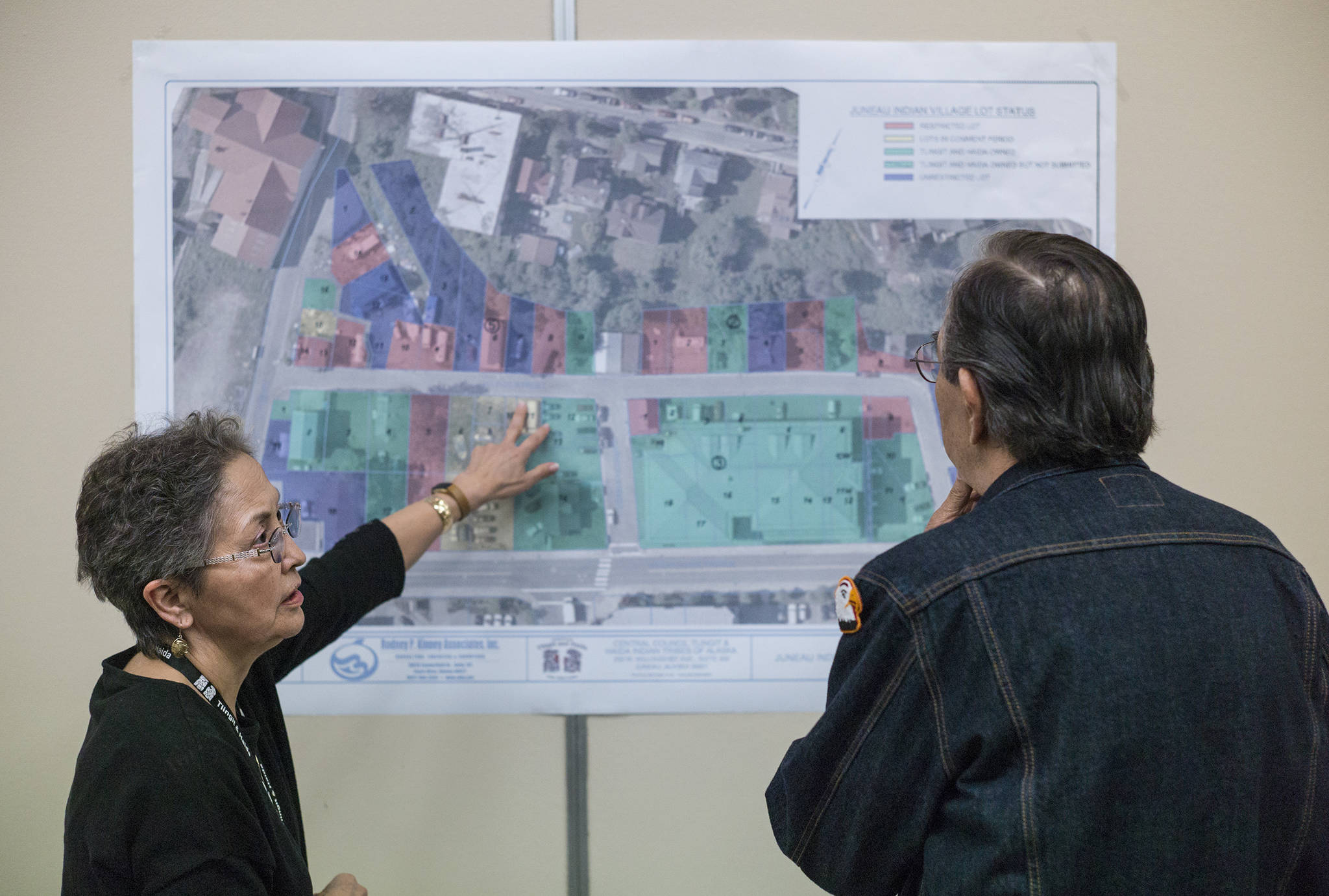Richard Peterson, the president of the Central Council Tlingit & Haida Indian Tribes of Alaska, is confident that the tribe’s application to put land in a federal trust will be approved. The biggest question now, in his view, is how the tribe will work with the City and Borough of Juneau if and when the application is approved.
Seeking to answer that question, CCTHITA and the CBJ are working together to draft an intergovernmental agreement that clears up how the city and the tribal association would interact if and when those plots of land go into a federal trust. The Bureau of Indian Affairs still has to make a decision about whether to approve the tribal association’s application, and that decision should come in the next couple months.
At an open house Wednesday to discuss the ins and outs of CCTHITA’s application to put seven small plots of land into trust, Peterson often referred to being a “good neighbor” to the CBJ during this application process.
“We need to work together,” Peterson said. “We need to put that foundation together so that we have a healthy community and a healthy tribe that’ll make that healthy community, that we can grow and prosper together.”
The tribe’s application is mostly in regard to lots that are in the parking lot at the Andrew Hope Building (which is CCTHITA’s governmental headquarters). Putting the land in trust would protect the land for generations to come, Peterson said. It would also exempt the land from local laws and property tax, which has grabbed the attention of the city.
[Central Council of Tlingit-Haida applying to put downtown land in federal trust]
Since early April, CCTHITA and CBJ have discussed how the dynamic would work if this land — which to amounts to about an acre in total — would be exempt from local laws and taxes. Madeline Soboleff Levy, the general counsel for CCTHITA, spoke at length about the intergovernmental agreement that the two parties are discussing.
Soboleff Levy said she expects the agreement to be done sometime soon, possibly in time for this coming Monday’s CBJ Assembly meeting.
The main components of this agreement are:
• The CBJ ensuring that it will continue to supply emergency services for instances on the land in trust, including fire and police enforcement.
• The CCTHITA supplying a payment in lieu of property taxes. Soboleff Levy estimated that the city will lose $1,471 per year in property tax as a result of this land going into trust, and the tribe is offering payment to recoup a portion of the city’s losses.
• Allowing the CBJ access to the land for water utility usage.
• Ensuring that the tribe continues to follow basic safety ordinances, such as an ordinance ensuring that the land is maintained well enough not to attract bears.
Peterson called this agreement “practical, not political,” saying that it’s being done in the interest of safety and community. More than 50 people attended Wednesday’s open house at the Andrew Hope Building, and one attendee asked why the tribe is negotiating with the city when the city will have no authority over this land once it’s in trust.
“It’s not so much that the tribe is required to enter into this agreement with the City and Borough of Juneau,” Soboleff Levy said. “This is a decision made by the executive council. The mayor and President Peterson have been meeting regularly as sort of co-located governments in order to try and be in communication with each other, be good neighbors, be good partners in economic endeavors.”
The CBJ Assembly’s Committee of the Whole met May 22 to discuss the tribe’s application, and Mayor Ken Koelsch went out of his way to express his respect for Peterson, who was in attendance at the meeting. The Assembly members aired concerns at the time about how much land the tribe was intending to put in trust in the future and what the land would be used for.
From discussions in recent weeks and the open house Wednesday — where Assembly members Mary Becker, Jesse Kiehl and Beth Weldon were present — those at the city are becoming more comfortable with the situation, Kiehl said. He spoke briefly at the end of the open house, saying he appreciated the way the two governments have interacted in recent weeks and that he’s looking forward to Monday’s Assembly meeting.
There are about 6,000 tribal citizens who live in Juneau, Soboleff Levy said, and Peterson was firm in his assertion that working with the CBJ is a vital part of this process.
“We’re gonna get land into trust,” Peterson said. “That’s just gonna happen. But I have been preaching since I’ve been elected that we need to be good neighbors, that we need to respect each other, and I’m being repetitive here, but healthy tribes make healthy communities.”
• Contact reporter Alex McCarthy at alex.mccarthy@juneauempire.com or 523-2271.

